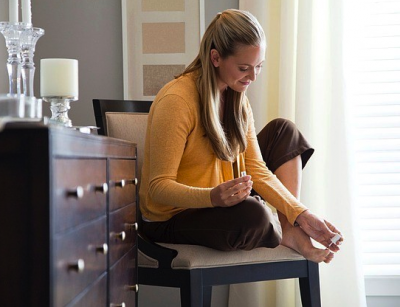Overcoming sexual abuse

Addie and Truitt’s parents were best friends. Their families were together on vacation, holidays, and most every weekend during the summer, especially when they went boating on the lake. Addie considered Truitt her older brother, so she was confused and scared when he touched her breasts during a sleepover on her 12th birthday, and then again the following week. It gradually grew more intimate, and kept happening for a full year before she realized she was enjoying it, even though she still wanted it to stop. It never did. Now, as an adult, she wanted to tell someone but didn’t know how to explain.
Lawrence was always Uncle Paul’s favorite. Ever since he was young, they always made a point to celebrate big milestones together. Middle school graduation was no exception, and Uncle Paul had Lawrence over to celebrate. He felt very grown up when his uncle let him have a beer to celebrate. But when they settled down to sleep that night, he didn’t know what he felt about the way Uncle Paul was touching him.
David was the classic “tomcat”. He practically made a career of seeing how many women he could bed. He never fully understood why he was so driven sexually, but did know it had something to do with his long-time babysitter as a child. That was where he’d had his first sexual experiences.
Janet had difficulty letting anyone in. She went on first date after first date, only to tell each suitor she wasn’t interested, when in fact she was. It had been like this for as long as she could remember, ever since her teen years. Some thing had gone on then that she knew wasn’t good, but couldn’t quite remember.
Mirabelle had been devout since she was a little girl, and had always been drawn in by the majesty and ritual of spiritual practice. When she was a teenager and spent increasing amounts of time at church, something happened between her and the minister that she’d always felt deeply ashamed of. Some adults in the congregation she’d trusted seemed to know that this sort of thing happened with young parishioners and the minister now and again, but none seemed terribly interested in talking about it. As an adult, she had a very difficult time conceptualizing who she was spiritually without thinking of all this.
Sexual abuse can happen to anyone.
It has been estimated that 20-40 percent of girls and 2-9 percent of boys are sexually abused by the time they reach eighteen. These are probably conservative estimates since many incidents of sexual abuse are never reported. It seems hard to believe, but sexual abuse happens much more frequently than most realize.
Sexual abuse defined.
Sexual abuse is any sexual behavior directed toward someone by a person who has power over them. And childhood sexual abuse involves any sexual behavior directed at a child. Such behavior always involves a betrayal of trust. In childhood in particular, sexual abuse can be confusing because it can (and often does) come at the hands of others near the same age. But again, the key is power differential. For example, the difference in maturity and insight between a 13-year old and a 16-year old is often quite significant. The 16-year old has undergone a number of developmental, physiological, social, and emotional changes the 13-year old has not.
Sexual abuse typically involves physical contact. Masturbation, intercourse, fondling, oral sex, and anal or vaginal penetration with objects. Other types of sexual abuse may not involve physical contact, but are still sexually violating. These involve pornography exposure, exhibitionism, leering, and sexual suggestiveness.
Sexual abusers are usually not strangers, a shocking and frightening fact to many. The U.S. Department of Health and Human Services estimates that as many as three quarters of reported cases of child sexual abuse are committed by those who are part of the victim’s immediate “circle of trust” such as family or friends. Sexual abusers can be anyone in a position of power, authority, or trust: peers, clergy, doctors, babysitters, teachers, neighbors, fathers, mothers, grandparents, uncles, cousins, stepfathers, or siblings.
How to know if you were sexually abused.
If you have some form of recollection about sexual abuse, it’s best to trust it. While your memories may not be exact (fuzzy memories is a fairly common phenomenon as it regards sexual trauma), it is unlikely that you simply “made it up.” If these recollections are regarding your childhood, they are likely to be even fuzzier. Individuals who’ve been sexually abused often cope automatically with some level of repression (i.e., forgetting sexual abuse ever happened). Even in the absence of waking, active memory, individuals can be triggered emotionally, spiritually, physically, or otherwise to experience fear, despair, sickness, panic, etc. Triggers may include facial expressions, words, tastes, smells, sounds, touch, and more.
But do I really need counseling for sexual abuse? Can’t I just let the past go?
Because sexual trauma is so confusing, frightening, and painful, many individuals sincerely desire to not ever discuss it. However, this kind of “swearing off” is typically a fundamentally flawed idea. When an individual swears off discussing incidences, they neglect to remember that those incidences inform part of who they are, even today. That is to say, a sexually abused person, for example, will always have been sexually abused – whether they are 5, 25, 55, or 85 – that sexual abuse is still a part of them. It need not define them, but to deny its existence at any age or stage is unwise. To boot, many individuals who espouse this line of thinking were never able to fully deal with their sexual abuse at the time of its occurrence, for any number of factors. In fact, many who seek counseling for sexual abuse may in fact be just be dealing with it for the first time.
The impact of sexual abuse.
If you’ve suffered sexual abuse and still aren’t sure whether you want to get help, consider the following list of the effects of sexual abuse from Ellen Bass and Laura Davis’s book, The Courage to Heal:
Self-Esteem
- Lack of belief in personal worth, or desire to prove worth.
- Feelings of shame or being dirty.
- Difficulty with self-care and nurturing.
- Perfectionism.
Feelings
- Difficulty pinpointing how you are feeling, even when asked.
- Concerned about “going crazy”.
- Difficultly knowing one feeling from another.
- Experiencing a very limited range of emotions.
- Fear of feeling much of anything, or belief that feelings are “out of control”.
Your Body
- Difficulty feeling totally “present” in your body. May even feel that you’ve left your body at times (dissociated).
- Restricted range of feelings in your body, or difficulty being in touch with what your body is communicating.
- Difficulty loving and accepting your body.
- Physical illness related to sexual abuse.
- Intentional self-harm.

- Difficulty trusting others.
- Fear of people.
- Ongoing sense of alienation or loneliness.
- Difficulty making commitments.
- Panicking when people get “too close” emotionally, physically, or otherwise.
- Expectation that people will leave you.
- Dating or otherwise involved with persons who remind you of your abuser, or someone you know is unhealthy for you.
Sexuality
- Using sex to meet needs that aren’t sexual.
- Feeling exploited sexually, or using your own sexuality in a way that is exploitive of others.
- Difficulty staying “present” when making love.
- Feeling numb or in a panic during sex.
- Avoidance of sex.
- Pursuing sex that you don’t really desire.
- Flashbacks during sex.
Some healthy steps to take now on your own.
- One: Treat yourself with compassion. What you’ve gone through is really quite significant, even though you may have spent years telling yourself otherwise.
- Two: Find support that will accept and validate your experience, rather than those who will continue to tell you to “move on.” Friends and family can be a good source of encouragement, but more often support groups or trained professionals are the way to go.
- Three: Recognize that you will heal! Even though your abuse will always be with you, it does not define you nor need to cause ongoing pain and suffering. Recovery is possible with time and help.
Outside Resource List
MISSOURI
Phone: 1-800-392-3738 (calling from outside MO)
573-751-3448 (inside MO)
Text: 1-800-669-8689
ILLINOIS
Phone: 1-800-25-ABUSE (calling from outside IL)
217-785-4020 (inside IL)
YWCA St. Louis Regional Sexual Assault Center –SART (Sexual Assault Response Team)
Specially trained volunteers assist rape victims at 17 area hospital emergency rooms in St. Louis and St. Louis County no matter the time of day or day of week.
Information: 314-726-6665
24-Hour Crisis Hotline: 314-531-RAPE (7273)
SART Website
Sexual Abuse Management Clinic (SAM) (located inside St. Louis Children’s Hospital)
Phone: (314) 454-2879
SAM Web Brochure
National Children’s Advocacy Center
210 Pratt Avenue
Huntsville, AL 35801
Phone: (256) 533-KIDS (256-533-5437)
Fax: (256) 534-6883
www.nationalcac.org
Prevent Child Abuse America
500 South Michigan Avenue Suite 200
Chicago, IL 60611
Phone: (312) 663-3520
Fax: (312) 939-8962
Toll-free: 1-800-244-5373
www.preventchildabuse.org
National Council on Child Abuse & Family Violence
1025 Connecticut Avenue, Suite #1000
Washington, DC 20036
Phone: (202) 429-6695
www.nccafv.org
National Center for Victims of Crime
2000 M Street, NW, Suite 480
Washington, DC 20036
Toll-free Helpline: 1-800-FYI-CALL
Monday-Friday, 8:30 am – 8:30 pm ET
www.ncvc.org
RAINN (Rape, Abuse & Incest National Network)
Toll-free: 1-800-656-HOPE
www.rainn.org
Survivors of Incest Anonymous
World Service Office
P.O. Box 190
Benson, MD 21018
Phone: (419) 893-3322
www.siawso.org
Message Us at contact@changeincorporated.org
Or use the form below — there’s no pressure.
Call Us
(314) 669-6242
ST. LOUIS COunseling Locations
NOW IN ONE EXPANDED & IMPROVED LOCATION TO SERVE YOU BETTER!
Change, Inc. South Hampton & 44:
3460 Hampton Avenue, Suite 204
St. Louis, MO 63139
PHONE/EMAIL HOURS:
Monday through Friday // 9a to 3p
Saturday // 12p to 3p
Contacts received before 3pm:
- returned the same business day
Contacts received after 3pm or on the Sundays:
- returned the next business day
314-669-6242 / 877-5-CHANGE (524-2643)
contact@changeincorporated.org
COUNSELING HOURS
7 DAYS PER WEEK:
10am to 9pm

